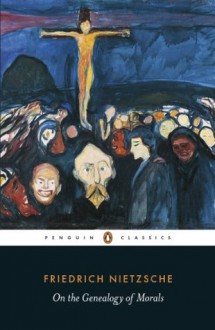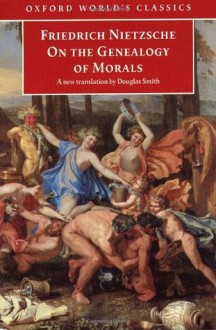
Three essays each coherent. This is Nietzsche's best work. Almost all of his major ideas lurk within this book. I would recommend the audio version. There's just something about Nietzsche that when he's read aloud you just feel the contempt and frustration you know he has for mankind and even the reader of his book.
He'll say the world needs artist and poets. He feels his truths and the reader feels them too. There's good and there's bad with Nietzsche. He has special dislike for women and feminism which even transcends the time period he's writing in. I could probably identify 10 statements through out the book that even a modern day misogynist would blush at. I hope that doesn't stop modern readers from reading this short masterpiece of a work.
Everything we know is tinted by our current context, its history and our expectations. Nietzsche does say in the book that most of philosophy is ahistorical, but in order to understand the proper context history must first be understood. (One of my favorite statements made by modern day homophobes often in the guise of religion is "marriage is between a man and a woman and it was Adam and Eve in the Garden of Eden not Adam and Steve". They always forget to mention the talking snake, and they were right when they made it a tautology, but, unfortunately for them, the world has moved and now it's 'marriage is between consenting adults' and there is a new tautology in play).
The theme that really ties all three essays together is that 'man prefers the will to nihilism more than the will to nothing'. The Christian (and Nietzsche seems to focus mostly on the most popular religion in Western Europe at that time) is the most nihilistic person of all for they have outsourced their morality to somebody else. Who truly acts for the good? The person who is promised an eternal life for performing according to scripture or the person who does the good for its own sake. Nietzsche is not a nihilist. He has a system and he defends them within these three essays.
"There are no truths, there are only perspectives" leading to the 'free spirit' as he said in the third essay, and in the first essay (or maybe the second?) he says what free spirit would actually do wrong because he has no God keeping him from acting wrongly? Almost none! The more inclusive set of beliefs that include the other inferior systems (a recursive process of sorts) give his rank order of being leading to his 'perspectivism' of truth and keeping out of a nihilistic trap.
He's really clued into the 'pernicious teleological' way for thinking that permeates society today. He illustrates by saying "the hand was made to grasp" after all that's what we do with it. The world gives but it also takes. Idle chatter distracts. He does obliquely mention his solution of 'modified poverty' (my words) for the fulfillment of a philosopher (artist, poet, or even a regular human like me). The philosopher should only have the bare minimum necessary to survive and the rest is too much (this will be another spot where he makes a gratuitous misogynistic statement which adds nothing to the point) and ends up taking more than giving (except for the gratuitous statement against women I have hearitly endorsed this advice for my life).
He has hints of his 'eternal return' within the second essay. But he only takes it as far as the absolute determination of the world. He knows man is an animal but quotes Spencer ('survival of the fittest') more than Darwin (or Huxely, Darwin's bulldog). He's definitely got a book that Nazis could embraced if they ignore the parts they don't like. He is not anti-Semite (he goes out of his way to attack the anti-Semites), but he does state the last great man was Napoleon, and Germans after 1930 could put Hitler within Nietsche's context of greatness. This book surprised me by how much what the Nazis thought could fit into this book with a little bit of editing.
"Will to Power" is a term people love to throw out when discussing Nietzsche. Nobody gets it right. I suspect even Nietzsche doesn't always know what he means by it. But, in the context of some of the book, he will say "man's instinct to freedom or what I call 'will to power'". Nietzsche doesn't believe in 'free will' as originally defined by St. Augustine because St. Augustine uses it for man analogously to God creating the universe. The 'will' is more in line with that which contain all of our feelings, passions, and emotions, the Dionysian man, our rational intuitions of sorts. The power is our drive (or driving, because Nietzsche would say we are always becoming we never are). Our drive comes about because everything that is must maintain itself and strives to conquer what is beyond it. (That's why Nietzsche calls out Napoleon as he does. That's why the Nazis would have embraced this book because Hitler would be their ideal man. Their aesthetic priest).
Man is an animal and thus has the instincts of an animal. Debt and Guilt (apparently practically the same word in German) are the onus society puts on us. Historically, cutting off someone's arm would compensate for my loss. As if, their suffering would make me better. That's how religion gets started. The ultimate Christian sacrifice is of course Jesus on the Cross as payment. Of course, Nietzsche calls all of this bunk. Everything up til know has been designed in such a way to take away our 'instinct of freedom' or our 'will to power'. The masters have been enslaved by the slaves (the Roman Nobels by the Jews according to Nietzsche). Our system of values have been turned upside down where the pitifiul, the needy, and the vulgar has been made the nobel, the good and the hoped for.
Nietzsche is clear. Man took a wrong turn after Homer. Truth (or the best perspective) is disclosed to man by appearance. It's not necessarily to have a Copernican Revolution of the Mind (he quotes Kant surprisingly often and actually in flattering ways) or to think that Plato's Cave with ideal forms is helpful. Truth is not correctness.
There are clear links to existentialism running throughout this book. Man is absolutely responsible for his own actions because of his freedom that he is given (according to him). Man first historically has created someone to blame (this is another one of the 10 times he'll single out women in a misogynistic way) thus leading to religion and probably psychiatrists. The hermeneutics of suspicion used by Nietzsche are clearly borrowed by the early 20th century psychoanalysts and this book shows why.
It's not what we see when we look at the great piece of art, but it's what the artist thinks. That forms the basis of his aesthetic ideal. They are going to lead us out of the wilderness.
I don't like most of what Nietzsche says, but I love his thought process. I'm glad that Republicans don't like him because they falsely see him as a Nihilist (but he surely is an Atheist), and they would be able to argue their viewpoints from a stronger perspective if they would take the time to read a masterpiece like this (Nietzsche knows how to 'feel' his way to the best perspective and in no uncertain terms he like the Republicans put the onus on the individual, and they would discount time and chance and say that government (or society) is the problem not the solution and most of all would never think "there but for the grace of the universe go I" since they both think the absolute freedom trumps equality almost always ). I suspect Nietzsche never wrote anything more coherent than this book of essays, but he's always worth reading and I would recommend this book because of the depth and cohesion within the book.



 Log in with Facebook
Log in with Facebook 









